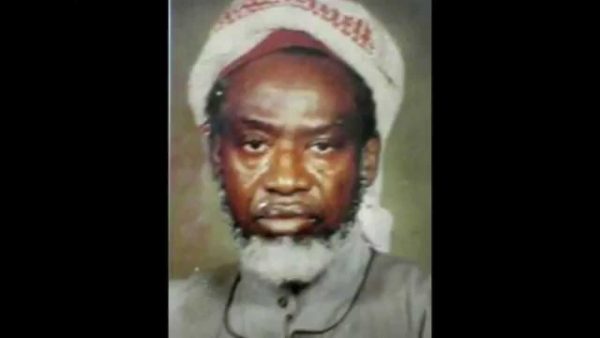Abubakar Mahmud Gumi, born 5th November 1922, was an outspoken Islamic scholar and Grand Khadi of the Northern Region of Nigeria (1962–1967), a position which made him a central authority in the interpretation of the Sharia legal system in the region.
Read more about Nigerians in history
He was a close associate of Ahmadu Bello, the premier of the Northern region in the 1950s and 1960s and became the Grand Khadi in 1967, the position was abolished.
Gumi emerged as a vocal leader during the colonial era, where he felt the practise of indirect rule had weakened the religious power of Emirs and encouraged westernization. Beginning in the 1960s, public conflicts emerged between him and leaders of the Sufi brotherhood, some of whom he later debated on television programs in the 1970s and 1980s.
By that time, he had managed to keep his ideas in the spotlight by holding Friday talking sessions inside the Kaduna Central Mosque (Sultan Bello Mosque).
He used the sessions to revive his criticism of established authorities based on his views of a back to source approach or the need to embrace a puritanical practice of Islam. He also criticized harshly the involvement of mysticism and the resulting syncretized practice of the Sufis.
He has a large number of children, however, his most popular child happens to be Dr Ahmad Abubakar Gumi who succeeded his father as the scholar of the central mosque Kaduna (Sultan Bello), Dr Ahmad Gumi is a certified medical doctor from Ahmadu Bello University Zaria and was a former military officer, he left the military and travel to study fiqh (Islamic jurisprudence) at the umm Al-Qura University in Mecca, Saudi Arabia where he obtained his PhD.
Early life and education
Gumi was born in the village of Gummi now a local government area in Zamfara state on the last Friday of Ramadan in the Islamic year 1344, to the family of Mahmud, an Islamic scholar and Alkali (judge) of Gummi.
His education started within the walls of his family when he was a pupil of his father’s Islamic teachings. He later sent to a school under the tutelage of a Malam called Musa at Ambursa, Sokoto province.
There he was introduced to Fiqh and read books and praise poems on the prophet. The first secular school he attended was the Dogondaji Primary School, while in primary school, he met the future 18th Sultan of Sokoto, Ibrahim Dasuki and excelled in religious duties.
He was made Hakimin Salla (leader of prayer) and was delegated responsibility for catering to the students religious activities. Within a year, he was transferred to the Sokoto Middle School, where Ahamdu Bello was teaching, there he was acquainted with Shehu Shagari, Waziri Muhammadu Junaidu, and Yahaya Gusau, the latter was a co-founder of Jamaat nasr al-Islam, a prominent Nigerian Muslim organization.
Sign up to the Connect Nigeria daily newsletter
After completing his studies at the middle school, he went to Kano to study Law and was trained as a Qadi. He started work as a scribe to Qadi Attahiru but he soon became disenchanted with the specifics of his job. He gave private lessons on Islam and tafsir as an escape from his disenchantment. He lost his father in 1937 while he was at the middle school. He got married 3 years later to Maryam in 1941 when he was just 19.
Early career
In 1947, Abubakar Gumi, left his job as secretary to Qadi Attahiru and went to teach at the Kano Law School, which he had previously attended. While in Kano, he met Sheik Sa’id Hayatu, a man widely considered one of the most prominent victims of colonial rule.
Hayatu was the leader of the Mahdiyya movement and had just returned from a forced sojourn in Cameroon. Abubakar became enthralled with the teachings of the movement and briefly became a follower of the Mahdiyya movement. He later married Hayatu’s daughter, Maryam.
However, she died after giving birth to a son. Abubakar Gumi first son wasn’t Ahmad Abubakar, but, Dr Hamza Abubakar a medical Doctor currently practising in Riyadh Saudi Arabia, followed by Maj. Gen. Abdulkadir Abubakar rtd. and two other elder sisters married to late Justice Muhammadu Bello former chief justice of the federation, and other married to Sheik Sunusi Gumbi a well known Islamic scholar and student to Abubakar Gumi.
In 1949, he took a teaching job at a school in Maru, Sokoto. The school had a famous tutor, Aminu Kano, who was the co-founder of the Northern Teachers Association and proprietor of a few Muslim schools.
Aminu and Gumi mingled and shared views on the influence of the traditional society with the Islamic faith and also the indifference or support given to the situation of Bida or syncretism by the Sufi brotherhoods.
He left Maru to further his education at the school of Arabic Studies in Kano. On completion of his studies, he became a teacher for two years at the school. He also attended a school of education in Sudan.
In 1957, he became an interpreter for the Northern Nigeria government on Saudi Arabia matters.
Awards And Honours
He received the Commander of the Order of the Federal Republic in 1987, he received the King Faisal International Prize from Saudi Arabia for his translation of the Quran into the Hausa language.
Abubakar Gumi who was referred to as the father of Izala as he usually mentioned during his Islamic teaching process, succeeded in overwhelming the establishment of the 1970s organisation by name izalatul bidi’ah wa iqamatussunah co-founded by one of his prominent student whom Gumi tutor in his previous job as a school teacher at school of Arabic studies (sas) in Kano, though he also maintain his membership in Jama’atu nasrul Islam (JNI) which favour him to proceed in his Islamic teachings at Kaduna central mosque handed by the above-mentioned organisation JNI.
He died on the 11th of September 1992 in London, England.
Source:
Wikipedia
Got a suggestion? Contact us: [email protected]


